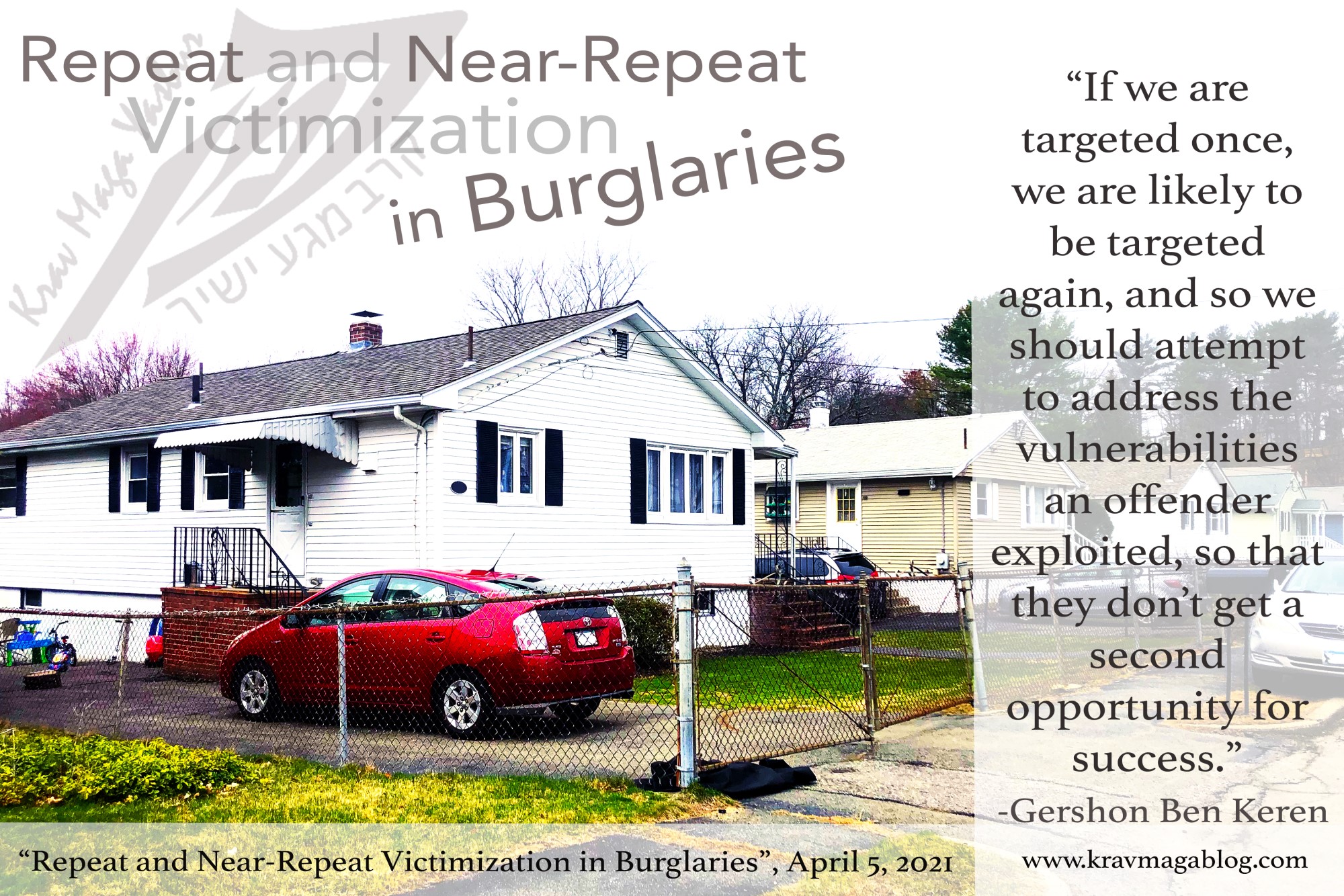I have written about repeat victimization before, however in this article I want to revisit the subject, along with near-repeat victimization, in relation to burglary. One of the reasons that crime hotspots occur is due to repeat victimization e.g., the same house is repeatedly broken into over the course of a year, and so the crime statistics – if reported at the neighborhood, or higher, level – make it look as if a particular locale suffers from a high burglary rate, rather than it simply being a few properties that are skewing the data. The same effect can also be seen in street robberies, where the same victims, are repeatedly targeted in the same area, making it appear that everybody is equally at risk of being victimized, when this is not the case. There is often a lot of judgment concerning repeat victimization e.g., if somebody was targeted once they were unlucky, but if they were victimized again it must be due to something they did – we naturally believe when bad things happen to others it is down to internal factors (the way the person looks, behaves, and acts etc.) but when bad things happen to us it is down to external factors e.g., we were just extremely unlucky etc. In the case of repeat victimization and street robberies it is easy/simple to ask questions like, “Why did they walk down that road again after having been mugged there?” The truth is, we can’t always perfectly control the routes we take, depending on where we live, work and/or go to school etc., just as we can’t always control the time of day when we are in particular places e.g., we work certain shifts, and use public transport to get to our place of work. It is easy to give out “good advice” such as telling people not to walk down dark alleys, but if using one cuts 20 minutes of your walk home, after a 40-minute bus journey, most people will make use of it – especially at the end of a long day of work. Whilst being targeted and victimized for any crime is undesirable, looking at why and how an incident happened can help us with further prevention.
It’s worth taking a moment to look at some of the reasons that repeat victimization burglaries occur. If a criminal is successful once, they are more likely to target that property again, and/or share their experience(s) with those they interact with, such as other burglars. It may be that on their initial break-in they lacked the means to carry off all the items they wanted, or felt under a time constraint to get in and out as quickly as possible, later realizing that they could have stayed much longer in the property than they initially realized. Any or all of these factors could mean that the same burglar will re-visit a home they broke into previously. Most criminals understand how quickly homeowners become complacent after a break-in. Initially, there will be feelings of violation, of not being safe in their own home, and counting the cost of possessions stolen etc. There will also be initially a tightening up of security e.g., checking that doors and windows are locked etc., and the resolve to get better locks for the windows and doors, maybe a desire to install motion sensors on outside lights, and even get some CCTV cameras and/or a burglar alarm etc. However, as time goes on, and feelings of safety creep in, denial and discounting of a future break-in do as well, and the burglary becomes viewed as an “unlucky one-off”, and often none of these measures are implemented. It’s probably also the case that because we are unable to significantly alter our routine activities – which burglars and other criminals understand – it is likely that we will again not be in our property on the same day, and at the same time, when the first burglary was committed e.g., when we are out at work. With this information/knowledge and a good chance that no further security measures have been taken since the first break-in, the chance of committing a successful repeat burglary is likely. It may be that a few weeks are allowed to elapse in order for you to replace the items stolen, before a second attempt is made. At the very least, we should learn from our past experiences and tighten up security around the point of entry that was used last time; if the burglar can’t access our property through this “familiar” route, they may decide that you have made significant changes, and they are effectively dealing with a “new” property.
Near-repeat victimization occurs when a property, near to one that was burgled is targeted. This means that should a burglary occur on your street or close to your home, you should try and find out, how the offense was committed, so that you can tighten up your property’s security e.g., if they entered through a garage attached to the house, and your house has a similar design, you will want to look at how you can make this entry/access point more secure. There are several reasons why near-repeat victimization is a common phenomenon, regarding burglaries. One is that many houses in an area are built to a similar design and layout, therefore a burglar may choose to target similar homes to one they were successful in breaking in, because they have a level/degree of familiarity with it e.g., they can move about more quickly in a property they know the layout of. Another reason is that if they got a good haul from the first property they broke into, they have a reason to suspect/believe that other similar houses will contain the same type of items and possessions. It is not just a familiarity with property types that is attractive to burglars – which is why many target properties that resemble the ones they live and/or have lived in – it is also a familiarity with the area/locale. If a burglar has some knowledge of streets, and potential escape routes, in a neighborhood, gained from their first visit/burglary, they are already more aware of how to get in and out of that locale, than they would be selecting a new one etc.
Repeat and near-repeat victimization significantly account for concentrations of crime and the development of hotspots. From a property perspective, the reputation an area gets from being deemed a high-crime neighborhood, can have long-term effects that can be difficult to escape from, such as through falling property values. If we are targeted once, we are likely to be targeted again, and so we should attempt to address the vulnerabilities an offender exploited, so that they don’t get a second opportunity for success.
Share:

Gershon Ben Keren
2.8K FollowersGershon Ben Keren, is a criminologist, security consultant and Krav Maga Instructor (5th Degree Black Belt) who completed his instructor training in Israel. He has written three books on Krav Maga and was a 2010 inductee into the Museum of Israeli Martial Arts.
Click here to learn more.

